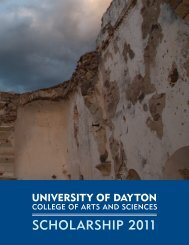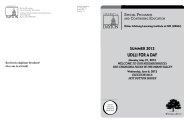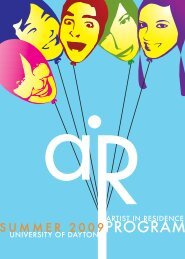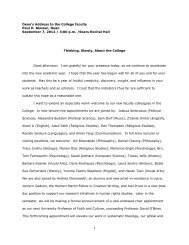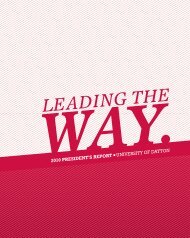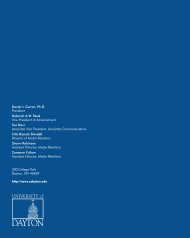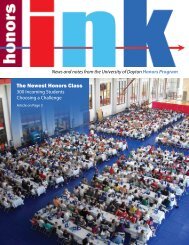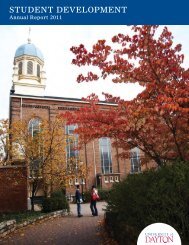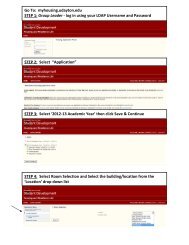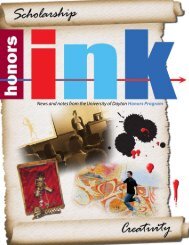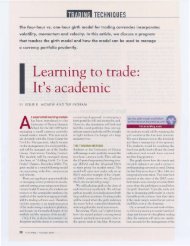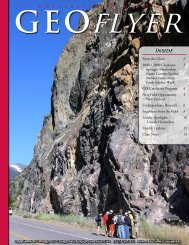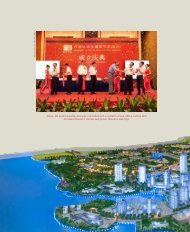Stander Symposium abstract book - University of Dayton
Stander Symposium abstract book - University of Dayton
Stander Symposium abstract book - University of Dayton
You also want an ePaper? Increase the reach of your titles
YUMPU automatically turns print PDFs into web optimized ePapers that Google loves.
9:00 AM to 5:00 PM<br />
“Teacher or Learner?: Graduate Teaching Assistants’ Negotiated Identities and Student<br />
Response”<br />
Presenter(s): Sarah N DelMar<br />
Advisor(s): Patrick Thomas<br />
English<br />
3:20 PM-3:40 PM<br />
Graduate Research Kennedy Union - 331<br />
For many Graduate Teaching Assistants the assigned responsibilities require a new pr<strong>of</strong>essional identity for this may be their first teaching experience<br />
as well as their first pr<strong>of</strong>essional experience. Graduate Assistants within the <strong>University</strong> <strong>of</strong> <strong>Dayton</strong>’s Department <strong>of</strong> English require a complex<br />
identity as both a full-time student and a composition course instructor. Teaching loads for Graduate Teaching Assistants require pr<strong>of</strong>essional<br />
identities that are constructed and performed for a significant number <strong>of</strong> undergraduate students; therefore, it is worth investigating how graduate<br />
students’ ethos - or credibility - as composition instructors are interpreted by students in their composition courses. A recent survey <strong>of</strong> undergraduates<br />
at the <strong>University</strong> <strong>of</strong> <strong>Dayton</strong> provides insight into the Graduate Teaching Assistants’ perceived ethos. The survey explored whether there<br />
is a correlation between students’ perceptions <strong>of</strong> their instructor’s ethos and students’ perceptions, in their later years, <strong>of</strong> the usefulness <strong>of</strong> their<br />
composition courses. Results from this survey indicate that while Graduate Teaching Assistants construct a pr<strong>of</strong>essional identity in order to receive<br />
a response from students, undergraduates also respond to the teaching performance and develop perceptions <strong>of</strong> instructors’ ethos. Graduate<br />
Teaching Assistants are in part underscored by their pedagogical communication as well as judged by undergraduate students on the effectiveness<br />
<strong>of</strong> the teaching and the composition course. Furthermore, the survey results ascertain specific practices Graduate Teaching Assistants, as well as<br />
other instructors, may assimilate in order to establish an advantageous perception <strong>of</strong> ethos.<br />
America Singing Loud: Shifting Representations <strong>of</strong> American National Identity in Allen<br />
Ginsberg and Walt Whitman<br />
Presenter(s): Eliza K Waggoner<br />
Advisor(s): Albino Carrillo<br />
English<br />
4:20 PM-4:40 PM<br />
Graduate Research Kennedy Union - 311<br />
Much work has been done to study the writings <strong>of</strong> Walt Whitman and Allen Ginsberg. Existing scholarship on these two poets aligns them in<br />
various ways (radicalism, form, prophecy, etc.), but most extensively through their homosexuality. While a vast majority <strong>of</strong> the scholarship produced<br />
on these writers falls under queer theory, none acknowledges their connection through the theme <strong>of</strong> my research-Americanism. Ideas <strong>of</strong><br />
Americanism, its representation, and what it means to be an American are issues that span both Whitman and Ginsberg’s work. The way these<br />
issues are addressed and reconciled by Ginsberg is vastly different from how Whitman interacts with the subject: a significant departure due to<br />
the nature <strong>of</strong> their relationship. Ginsberg has cited Whitman as an influence on his work, and other scholars have commented on the appearance<br />
<strong>of</strong> this influence. The clear evidence <strong>of</strong> connection makes their different handling <strong>of</strong> similar subject matter, and most importantly a subject matter<br />
that conveys personal and national identity, a doorway into deeper analysis <strong>of</strong> the interworking <strong>of</strong> these two iconic American writers.<br />
FITZ CENTER FOR LEADERSHIP AND COMMUNITY<br />
Destination <strong>Dayton</strong>: <strong>Dayton</strong> Civic Scholar Junior Cohort Capstone Project<br />
Presenter(s): Kyle M Grabowski, Zachary S Hadaway, Briana M Hollis, Marina S Locasto, Katherine B Repic,<br />
Nicholette T Smith, Amy M Sullivan<br />
Advisor(s): Richard T Ferguson, Suzette Pico, Donald A Vermillion<br />
Fitz Center for Leadership in Community<br />
2:20 PM-3:00 PM<br />
Senior/Capstone Project Kennedy Union - 222<br />
A program <strong>of</strong> the Fitz Center for Leadership in Community, the <strong>Dayton</strong> Civic Scholars gives students the opportunity to become civic leaders within<br />
the <strong>Dayton</strong> community. Over three years, <strong>Dayton</strong> Civic Scholars complete 360 hours <strong>of</strong> community engagement, academic course requirements,<br />
and a capstone project. Presented by the junior cohort <strong>of</strong> <strong>Dayton</strong> Civic Scholars, this session will discuss their capstone project, Destination <strong>Dayton</strong>.<br />
The mission <strong>of</strong> Destination <strong>Dayton</strong> is to organize and facilitate a series <strong>of</strong> events that occur in the city <strong>of</strong> <strong>Dayton</strong> (outside <strong>of</strong> the “UD bubble” ) in<br />
116



